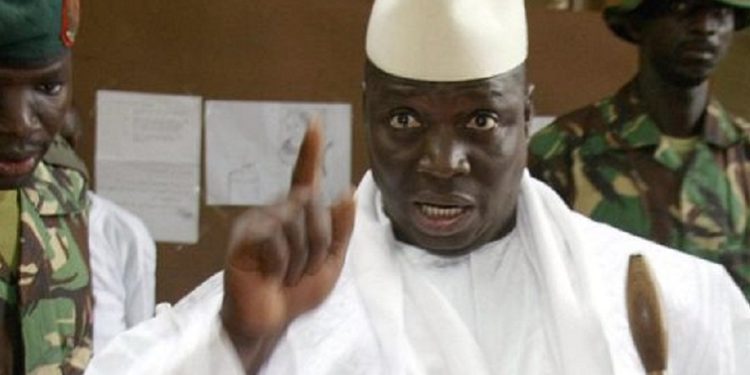Gambian soldiers working for a hit squad controlled by former President Yahya Jammeh on Tuesday admitted to participating in the 2005 execution of 56 West African migrants, including 44 Ghanaians on the orders of Jammeh.
Lieutenant Malick Jatta and Corporal Omar A. Jallow revealed to Gambia’s Truth, Reconciliation and Reparations Commission (TRRC) that the migrants were executed by the “Junglers” squad, a paramilitary force that took orders from Jammeh, across the Gambian border in Senegalese territory.
“We were told they were mercenaries,” Jatta said, adding that he shot and killed one of the migrants. “I heard people shouting in the forest saying ‘save us Jesus.’”
“Political will needed to ensure justice in murder of 44 Ghanaians in The Gambia” Jallow told the TRRC that Lt Col Solo Bojang, the leader of the operation, told the men that “the order from Yahya Jammeh is that they are all to be executed.” In a reaction to the testimonies by the two soldiers, the Jammeh2Justice Ghana Campaign, a civil society coalition seeking to bring Jammeh and those who bear the greatest responsibility for the massacre of Ghanaians to justice said, the public testimonies by the two soldiers add to the mountain of evidence against Jammeh and his accomplices.
Its campaign co-ordinator, William Nyarko, asked the Government of Ghana to take an active interest in the proceedings at the TRRC and seek justice for the Ghanaians, adding, other West African states, including Nigeria, Togo, and Ivory Coast whose nationals were also unlawfully killed should do same for their nationals.
EMPRESS COURT
The Jammeh2Justice Ghana Campaign is led by the Ghana Center for Democratic Development (CDD-Ghana) in collaboration with its partners Media Foundation for West Africa (MFWA), Africa Center for International Law and Accountability (ACILA), Amnesty International, Human Rights Advocacy Center (HRAC), POS Foundation, and Commonwealth Human Rights Initiative (CHRI).
The confessions by Jatta and Jallow corroborate findings in a May 2018 report by Human Rights Watch and TRIAL that the migrants were murdered by the “Junglers.”
Jammeh has always denied involvement in the killings. “The testimony of Jammeh’s henchmen confirm that the migrants were murdered by paramilitary death squad taking orders from President Jammeh,” said Reed Brody, counsel at Human Rights Watch.
“It is now time to get to the bottom of Jammeh’s responsibility.” Jammeh is currently in Equatorial Guinea, where he sought exile after losing the 2016 presidential election to Adama Barrow.
Jammeh’s rule was marked by widespread abuses, including forced disappearances, extrajudicial killings, sexual violence, torture and arbitrary detention. Jatta said after killing one migrant, he saw another of the migrants running to hide at a distance of about 20 meters from him.
“I can say I saved this person. If I wanted to kill him, at 20 meters sir, I will not miss my target,” Jatta told TRRC Chief Counsel Essa Faal.
It is possible that Jatta was referring to the one survivor of the incident, Martin Kyere. Kyere had dodged gunmen’s bullets after jumping from a truck that was carrying the detained migrants before the Junglers killed them.
Following publication of the Human Rights Watch and TRIAL report, the government of Ghana said it was weighing re-opening its investigation into the July 2005 massacre.
One year later, however, the government has taken no action.
A coalition of Ghana groups, led by the former Head of the Ghana Commission on Human Rights and Administrative, CHRAJ, Justice Emile Short, has called on the government to “expedite actions, steps; legal, political, diplomatic to make sure justice is served.”
The survivor, Martin Kyere, reacted to today’s news by calling on the Ghana government to move forward with the investigation.
“We want our government to say, yes, it is time to find justice for the 44 people who were killed,” said Kyere.
In addition to Ghanaians, the massacre victims included citizens from Nigeria, Senegal, Togo, and Côte d’Ivoire.
On Monday, Jatta had confessed to involvement in 3 executions, including the killing of journalist Deyda Hydara in 2004.








